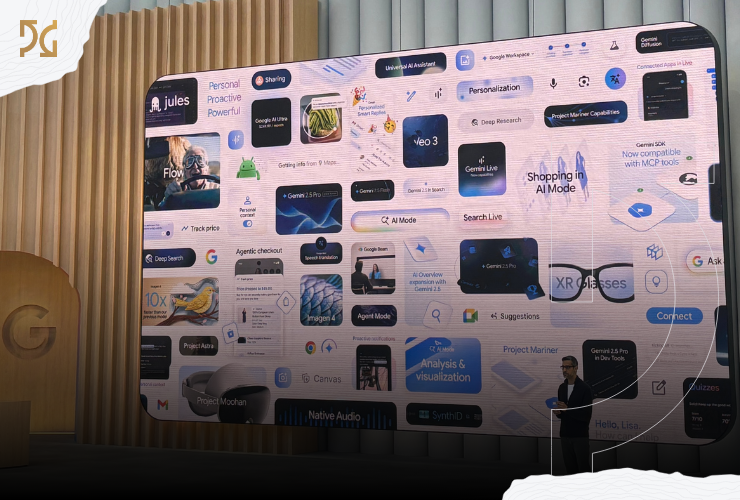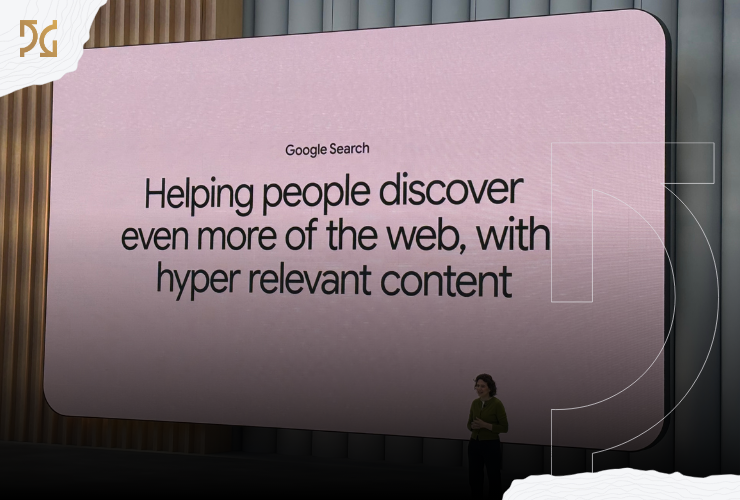At Google I/O 2025, Sundar Pichai and Liz Reid unveiled the most sweeping transformation of search in Google’s history. Search, as we know it, is no longer a list of blue links, this change has been underway for many years. Now they unveil the beginning of an intelligent, agentic, multimodal assistant designed to get things done on your behalf.
With over 1.5 billion users now engaging with AI Overviews monthly, the traditional SEO playbook has some new chapters. This isn’t a subtle evolution. It’s a wholesale reimagining of how users discover, evaluate, and interact with information — and what it means to “rank” in a world driven by Gemini-powered AI.

1. AI Overviews and AI Mode: A New Search Interface for the Web
Google’s AI Overviews have become one of the most successful product rollouts in a decade, now driving over 10% of queries in major markets like the U.S. and India. Meanwhile, AI Mode, introduced at I/O 2025, is a separate tab in the main search experience offering a full-stack generative interface powered by Gemini 2.5.
Key SEO Impact:
- Search real estate is now AI-curated. Instead of competing for the top 10 blue links, brands are competing for inclusion in synthesized summaries, follow-ups, and smart UI elements (e.g., maps, graphs, product cards).
- Multi-step queries are the norm. Users are asking 2–3x longer questions, expecting reasoning and citation. This favors comprehensive, structured content over short-form or surface-level SEO copy.
- AI Mode will become the core experience. Many of its cutting-edge capabilities are being folded back into regular Google Search — meaning the gap between traditional search and AI search will shrink rapidly. This is a clear tactic to address ChatGPT search capabilities.
2. Query Fan-Out and Deep Search: The Engine Behind AI Search

One of the biggest technical shifts is what Google calls query fan-out — a process where AI Mode decomposes complex questions into many sub-queries, runs them in parallel, synthesizes results, checks quality, and issues more searches if needed.
Google’s Deep Search goes even further — issuing hundreds of searches on your behalf to compile expert-level, fully cited answers.
Key SEO Impact:
- Search is deeper, not broader. AI is reaching into the long tail of content and drawing on niche sources with specificity and clarity.
- High-quality, granular content now has more value. If your content answers subcomponents of a larger query — even on niche topics — it could be surfaced as part of a larger AI response.
- Citation and trust signals matter more. Google is doubling down on reliability, issuing more queries when answers are uncertain. Content with schema, reputation, author signals, and consistency will have an advantage.
3. Multimodal & Live Search: From Text to Sight, Sound, and Speech

Visual search is exploding. Google Lens has surpassed 1.5 billion monthly users, and now Project Astra is bringing real-time multimodal search to Android and iOS. Whether it’s using your phone’s camera, voice, or screen-sharing, users can engage with search in live, conversational formats.
Key SEO Impact:
- Discovery is visual, contextual, and conversational. Content must be optimized not just for keywords, but for imagery, captions, mobile UX, and voice-to-text recognition.
- Contextual AI answers are the future. Structured data, schema.org markup, alt text, and visual metadata are now critical SEO investments.
- Search is happening “in the moment.” Real-time answers (e.g., AR overlays, translated speech, product ID from live video) demand rapid indexation and fast-loading, adaptable content.
4. Agentic Search: From Discovery to Action
Google’s introduction of agentic search behavior — powered by Project Mariner — marks a shift toward search that acts for users. AI Mode can now:
- Fill out forms.
- Compare ticket prices.
- Find and book reservations.
- Summarize your emails and match your personal style.
Key SEO Impact:
- Websites must be machine-operable. Your site’s UX, forms, and data structures need to be usable by AI agents — not just people.
- MCP or Model Context Protocol data will be necessary to drive funnel conversion in the SERP. Expect more zero-click experiences as AI agents complete tasks without visiting your site.
- Ecommerce and local businesses need AI-friendly integrations. This includes Merchant Center, Google Shopping Graph, structured product and service metadata, and live inventory data.
5. Personal Context and Privacy-Aware Discovery
Google is introducing Personal Context to search — letting Gemini draw from Gmail, Calendar, Docs, Maps, and past searches to customize results. This means users will see search results tailored to their travel plans, favorite restaurants, or recent purchases.
Key SEO Impact:
- Search results will differ user-to-user based on first-party Google data. This means traditional keyword rank tracking will become less meaningful.
- First-party relationships will matter. Brands that integrate across Google’s ecosystem (e.g., Gmail reservations, YouTube engagement) can influence discoverability.
- Consent, trust, and transparency are essential in other marketing channels. Users control what Gemini accesses. Trustworthy, clearly-permissioned data will be rewarded.
6. Shopping, Fashion, and Try-On: AI Meets Ecommerce
Google is fusing AI and shopping in ways that radically change the buying journey. AI Mode now:
- Understands fashion preferences and body types.
- Offers virtual try-ons.
- Tracks product price drops.
- Uses agentic checkout to complete purchases.
Key SEO Impact:
- Product data must be rich, real-time, and visual. Feed quality, image tagging, inventory freshness, and price accuracy are all SEO levers now.
- AI-native shopping content wins. Pages that include try-on options, lifestyle imagery, reviews, and clear CTAs will be favored.
- Retailer competition moves to the assistant layer. Brands will be chosen by agents — not just users — based on data quality and integration.
Final Thoughts: The New SEO Mandate
Search is no longer a question-and-answer interface — it’s a proactive, intelligent system that completes goals, synthesizes knowledge, and adapts to the individual.
SEO’s future will be defined by four capabilities:
- Content Structuring: Using schema, semantic relationships, and logical topical depth.
- Agent Readiness: Design sites to be usable by machine agents and bots.
- Multimodal Optimization: Support visual, voice, and real-time experiences.
- Data Integration: Supply real-time feeds and metadata across shopping, local, and app-based surfaces.
- Expanded Reach: Success in other marketing channels and connectedness within relevant verticals will determine reach.
At Previsible, we believe this is the most exciting time in SEO history. Google isn’t just changing the algorithm — it’s changing the interface of discovery. And that opens up a powerful opportunity for those who can evolve ahead of the curve.
Navigate the future of search with confidence
Let's chat to see if there's a good fit
SEO Jobs Newsletter
Join our mailing list to receive notifications of pre-vetted SEO job openings and be the first to hear about new education offerings.






